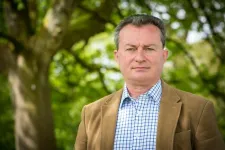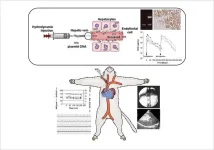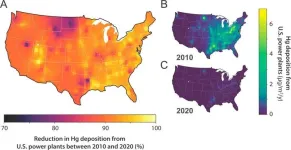(Press-News.org) Today, an estimated 41,000 people in the United States live with the loss of an upper limb, including hundreds of service men and women. Although significant progress has been made in the durability, control and function of upper-limb prosthetic devices, they lack complete integration into the body and, importantly, do not enable their users to feel.
Now, with the award of an $8.7 million grant from the National Institutes of Health (NIH), Shirley Ryan AbilityLab — the top-ranked physical medicine and rehabilitation hospital — and its research partners have an opportunity to significantly advance the field of bionics by applying osseointegration in a novel manner.
Osseointegration is a technique whereby a metal implant is surgically attached to a person’s residual bone. The implant then becomes an integrated extension of the body — providing a direct attachment between the bionic and residual limb. Then, a special system called e-OPRA (Enhanced Osseoanchored Prostheses for the Rehabilitation of Amputees) uses electrodes implanted into muscle to provide robust sensory feedback through peripheral nerve stimulation, restoring the feeling of touch.
The study is the first to combine osseointegration, targeted muscle reinnervation (TMR) and pattern-recognition control using implanted electromyographic (EMG) sensors. (TMR is a revolutionary surgical technique — that was developed by collaborators at Northwestern Medicine and Shirley Ryan AbilityLab — to allow those with amputations control of bionic prostheses.) It also is the first in-home trial of the e-OPRA system in people with upper-limb amputations who have had TMR surgery and use a Coapt Gen2 pattern recognition–controlled myoelectric prosthesis.
“With this combination of novel and advanced technologies, the device should feel much more like a person’s actual limb,” said Levi Hargrove, the study’s lead researcher and director of the Regenstein Foundation Center for Bionic Medicine at Shirley Ryan AbilityLab. “This study builds on many years of our
leadership in bionic medicine, and marks a significant step forward in making this intuitive technology broadly available for the first time.”
As part of the study, Shirley Ryan Ability is partnering with Integrum, a Swedish company that invented the osseointegration technique, and Northwestern Medicine, which will implant the device and perform TMR surgery on eight research subjects. Researchers at UChicagoMedicine and Bionics Institute in Australia also will support the study.
Following the surgeries, the research team will lead two clinical trials to evaluate the comfort and function with implanted electrodes through e-OPRA — compared to and combined with the state-of-the-art clinical solution using Coapt’s Gen2 pattern recognition system — and to evaluate the effects of providing sensory feedback.
“Engineers, material scientists, neurophysiologists and surgeons have never before come together on this scale to apply osseointegration in this manner,” said Rickard Branemark, CEO and founder of Integrum AB. “We are very excited to collaborate on this important work.”
The five-year grant is being funded through the NIH’s UG3 and UH3 mechanisms, which specifically are targeted to translating groundbreaking neural technologies for patients.
The award comes on the heels of another, recently funded $1.5 million U.S. Department of Defense grant for Shirley Ryan AbilityLab and its research collaborators to evaluate functional mobility, neural control and user satisfaction as they relate to osseointegration in bionic legs.
About Shirley Ryan AbilityLab
Shirley Ryan AbilityLab, formerly the Rehabilitation Institute of Chicago (RIC), is the global leader in physical medicine and rehabilitation for adults and children with the most severe, complex conditions — from traumatic brain and spinal cord injury to stroke, amputation and cancer-related impairment. The organization expands and accelerates leadership in the field that began at RIC in 1953. The quality of its care has led to the designation of “No. 1 Rehabilitation Hospital in America” by U.S. News & World Report every year since 1991. Upon opening in March 2017, the $550 million, 1.2-million-square-foot Shirley Ryan AbilityLab became the first-ever “translational” research hospital in which clinicians, scientists, innovators and technologists work together in the same space, surrounding patients, discovering new approaches and applying (or “translating”) research real time. This unique model enables patients to have 24/7 access to the brightest minds, the latest research and the best opportunity for recovery. Shirley Ryan AbilityLab is a 501 (c)(3) nonprofit organization. For more information, go to www.sralab.org.
About Integrum
Integrum AB is a publicly traded company (INTEG B: Nasdaq First North Growth Market) based outside of Gothenburg, Sweden, with a U.S. subsidiary in San Francisco, CA. Since 1990, osseointegration, the science behind the OPRA™ Implant System, has been helping individuals with amputations enjoy a dramatically improved quality of life. Thorough surgical experience gained over more than three decades, from more than 500 surgeries, in 14 countries, has led to the development of Integrum’s system for bone-anchored prostheses — a vastly superior alternative to the traditionally used socket prosthesis. For more information, please visit www.integrum.se.
END
Shirley Ryan AbilityLab receives $8.7 Million NIH grant for first-of-its-kind bionic arm osseointegration study
Study has potential to restore sensation for those with upper-limb amputations
2023-06-08
ELSE PRESS RELEASES FROM THIS DATE:
Bath Professor given international award recognizing lifetime research achievements
2023-06-08
Professor Laurence Hurst, Director of the Milner Centre for Evolution at the University of Bath, has been recognised for his world-leading research into genetics and evolution with a prestigious Humboldt Prize.
The Humboldt Prize, also known as the Humboldt Research Award, is an award given by the Alexander von Humboldt Foundation of Germany to internationally renowned scientists and scholars who work outside of Germany in recognition of their lifetime's research achievements.
Named after the Prussian naturalist and explorer Alexander von Humboldt, recipients of the prize are academics whose “fundamental discoveries, new ...
Employers should think twice before implementing peer recognition programs
2023-06-08
In fast-paced and often rapidly changing work environments, employers continue to seek new and improved ways to recognize employees in the workplace. However, new research from the University of Waterloo suggests that public peer recognition may backfire by enabling comparisons among employees, and these comparisons may make some employees feel unfairly treated.
“Employers have sought out various peer recognition systems in an effort to promote employee helping behaviour,” said Pei Wang, PhD ...
A new way to develop drugs without side effects
2023-06-08
Have you ever wondered how drugs reach their targets and achieve their function within our bodies? If a drug molecule or a ligand is a message, an inbox is typically a receptor in the cell membrane. One such receptor involved in relaying molecular signals is a G protein-coupled receptor (GPCR). About one-third of existing drugs work by controlling the activation of this protein. Japanese researchers now reveal a new way of activating GPCR by triggering shape changes in the intracellular region of the receptor. This new process can help researchers design drugs with fewer or no side effects.
If the ...
Liver lobe-specific hydrodynamic gene delivery to baboons: A preclinical trial for hemophilia gene therapy
2023-06-08
Niigata, Japan - The research group of Professor Kamimura in Niigata University have applied the novel, liver lobe-specific hydrodynamic delivery procedure to primates (baboons) for the first time. “Delivery of a plasmid that expresses a therapeutic gene for human hemophilia achieved therapeutic levels of human factor IX gene expression lasting for 200 days after the delivery of a plasmid”, says Prof. Kamimura. In addition, the results demonstrated the efficacy of repeated hydrodynamic gene delivery into the same liver lobes. Furthermore, no plasmid was introduced into organs other than the livers ...
One-month of COVID-19 lockdown cost heart attack patients up to two years of life
2023-06-08
Sophia Antipolis, 8 June 2023: Patients who had heart attacks during the first COVID-19 lockdown in the UK and Spain are predicted to live 1.5 and 2 years less, respectively, than their pre-COVID counterparts. That’s the finding of a study published today in European Heart Journal – Quality of Care and Clinical Outcomes, a journal of the European Society of Cardiology (ESC).1 The additional costs to the UK and Spanish economies are estimated at £36.6 million (€41.3 million) and €88.6 million, respectively, largely due to absence from work.
“Restrictions to treatment of life-threatening conditions have immediate and long-term ...
Long Covid can impact fatigue and quality of life worse than some cancers
2023-06-08
Fatigue is the symptom that most significantly impacts the daily lives of long Covid patients, and can affect quality of life more than some cancers, finds a new study led by researchers at UCL and the University of Exeter.
The research, published in BMJ Open and funded by the National Institute for Health and Care Research (NIHR), examines the impact of long Covid on the lives of over 3,750 patients who were referred to a long Covid clinic and used a digital app as part of their NHS treatment for the condition.
Patients were asked to complete questionnaires on the app about how long Covid was affecting them – considering the impact of long Covid on their day-to-day activities, ...
Gradual supported release of primates into the wild shown as effective
2023-06-08
Gradually re-introducing primates into the wild with post-release support has, for the first time, been scientifically shown to improve their well-being.
Every year, rescue centres release animals, that are deemed ready, into the wild, based on the assumption that the animals will thrive most in their natural habitat, but this assumption has never been scientifically tested with primates.
A team from Durham University, Disney’s Animals, Science and Environment and the Jane Goodall Institute ...
Essential investment in plant and microbial research in Norwich, UK, confirmed
2023-06-08
Development of an exciting, ground-breaking plant and microbial science and innovation hub can go ahead with confirmation of funding announced today.
The transformational investment will fund new cutting-edge, world-class facilities for the John Innes Centre (JIC) and The Sainsbury Laboratory (TSL) at the heart of the Norwich Research Park. This will deliver a step change in our capability to translate scientific knowledge into bio-based solutions in response to some of society’s most pressing challenges.
As well as transforming the existing capabilities of the John Innes Centre and The Sainsbury Laboratory, both internationally recognised ...
Despite major progress nationally, two mercury emissions hotspots remain
2023-06-07
Missing from partisan political debates over regulations affecting the energy sector is the stunning success of the federal government’s signature environmental laws. A prime example: the U.S. Environmental Protection Agency’s rules aimed at reducing the harmful effects of hazardous air pollutant (HAP) emissions from fossil fuel-fired power plants known as the Mercury and Air Toxics Standards, or MATS.
A new study from the Harvard John A. Paulson School of Engineering and Applied Sciences (SEAS) shows that in the decade since the standard was ...
What your likes, posts really say about you
2023-06-07
The myriad ways in which we use social media can be grouped into four broad categories, each of which is associated with a cluster of specific personality and behavioral traits, suggests new research from Washington University in St. Louis.
“Social media is here to stay, so clarifying how people use social media and raising awareness of these findings are crucial first steps toward ultimately helping people understand how they can avoid the negative aspects of social networking and engage in healthier social media usage,” said Alison B. Tuck, first author of the study and a PhD candidate in clinical psychology in Arts & Sciences.
The study, published online ...
LAST 30 PRESS RELEASES:
Urban trees can absorb more CO₂ than cars emit during summer
Fund for Science and Technology awards $15 million to Scripps Oceanography
New NIH grant advances Lupus protein research
New farm-scale biochar system could cut agricultural emissions by 75 percent while removing carbon from the atmosphere
From herbal waste to high performance clean water material: Turning traditional medicine residues into powerful biochar
New sulfur-iron biochar shows powerful ability to lock up arsenic and cadmium in contaminated soils
AI-driven chart review accurately identifies potential rare disease trial participants in new study
Paleontologist Stephen Chester and colleagues reveal new clues about early primate evolution
UF research finds a gentler way to treat aggressive gum disease
Strong alcohol policy could reduce cancer in Canada
Air pollution from wildfires linked to higher rate of stroke
Tiny flows, big insights: microfluidics system boosts super-resolution microscopy
Pennington Biomedical researcher publishes editorial in leading American Heart Association journal
New tool reveals the secrets of HIV-infected cells
HMH scientists calculate breathing-brain wave rhythms in deepest sleep
Electron microscopy shows ‘mouse bite’ defects in semiconductors
Ochsner Children's CEO joins Make-A-Wish Board
Research spotlight: Exploring the neural basis of visual imagination
Wildlife imaging shows that AI models aren’t as smart as we think
Prolonged drought linked to instability in key nitrogen-cycling microbes in Connecticut salt marsh
Self-cleaning fuel cells? Researchers reveal steam-powered fix for ‘sulfur poisoning’
Bacteria found in mouth and gut may help protect against severe peanut allergic reactions
Ultra-processed foods in preschool years associated with behavioural difficulties in childhood
A fanged frog long thought to be one species is revealing itself to be several
Weill Cornell Medicine selected for Prostate Cancer Foundation Challenge Award
Largest high-precision 3D facial database built in China, enabling more lifelike digital humans
SwRI upgrades facilities to expand subsurface safety valve testing to new application
Iron deficiency blocks the growth of young pancreatic cells
Selective forest thinning in the eastern Cascades supports both snowpack and wildfire resilience
A sea of light: HETDEX astronomers reveal hidden structures in the young universe
[Press-News.org] Shirley Ryan AbilityLab receives $8.7 Million NIH grant for first-of-its-kind bionic arm osseointegration studyStudy has potential to restore sensation for those with upper-limb amputations




